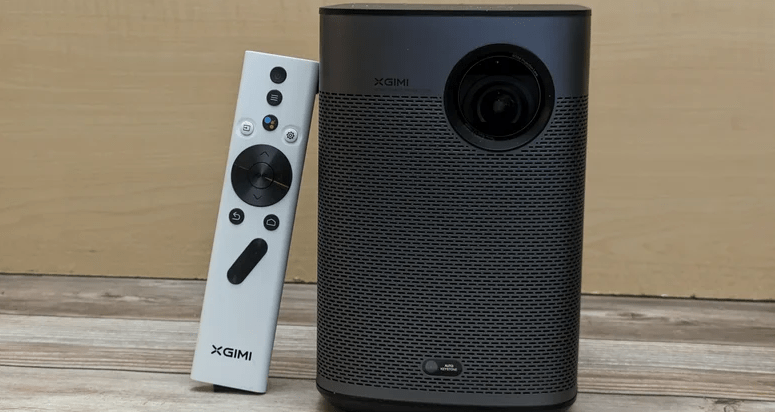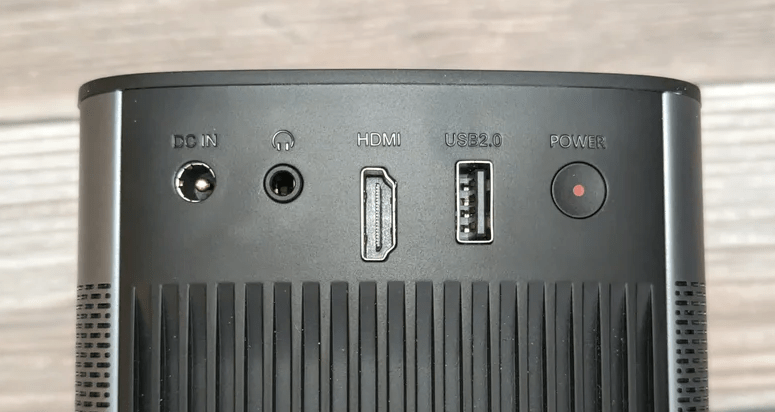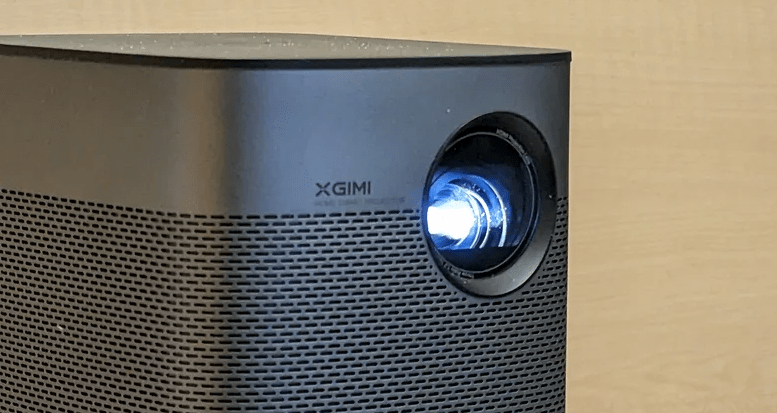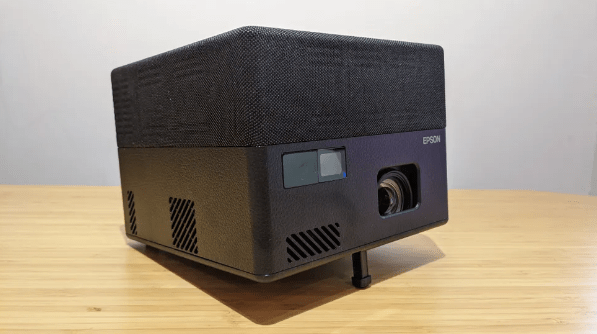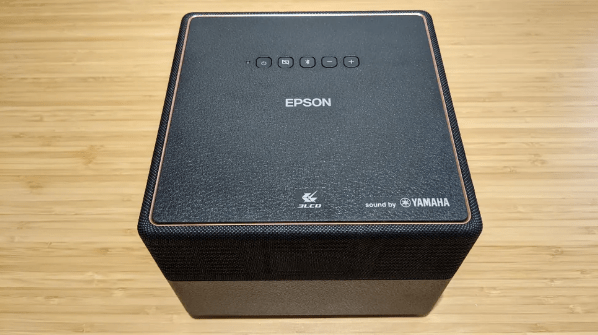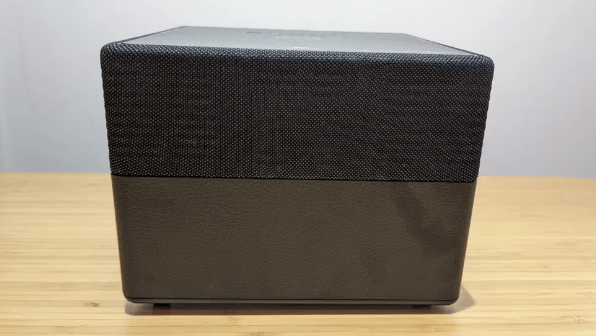At gagadget.com, your trust is our priority. We follow strict quality standards in our research, tests, and analysis of video projectors, to give you the best experience. Learn more
XGIMI Halo Plus vs Epson EF12
Hey everyone, Jim's here! Today, I'm comparing two of the most popular portable projectors on the market: the XGIMI Halo+ and the Epson EF12. Both offer full HD 1080p resolution, built-in Android TV, and compact designs for easy on-the-go use. But they also have some key differences in brightness, throw ratio, battery life, and more that could make one a better fit for your needs.
I've spent quality time testing both projectors in various environments, evaluating image quality, ease of use, sound performance, and overall value. In this head-to-head shootout, I'll share my experiences to help you decide which one will be your ultimate portable entertainment companion. Let's get started!
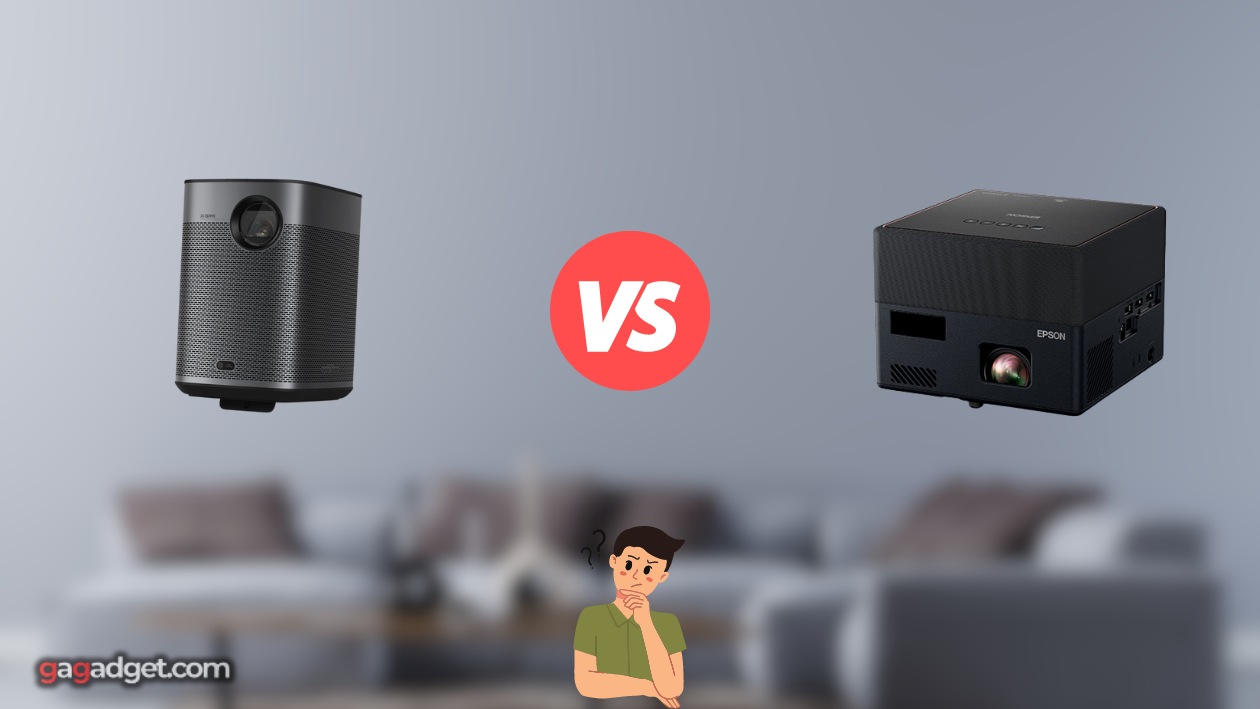
XGIMI Halo+ vs Epson EF12: Quick Overview
If you're in a hurry, here's my quick take: The XGIMI Halo+ and Epson EF12 are both excellent portable projectors with built-in streaming smarts. The Halo+ has a slight edge in brightness at 900 ANSI lumens vs the EF12's 1,000 ISO lumens. But the EF12 boasts a better 200,000:1 contrast ratio, wider color gamut, and ultra-short throw lens for large images in small spaces.
I recommend the XGIMI Halo+ for those who value maximum portability, with its lighter weight, more compact size, and built-in battery. The Epson EF12 is the superior choice for a flexible "portable home theater" you can easily move between rooms, thanks to its shorter throw, higher contrast, and robust connectivity.
Table of Contents
- XGIMI Halo+ vs Epson EF12: Full Comparison
- EF12 vs Halo+: Design
- XGIMI Halo+ or Epson EF12: User Reviews
- XGIMI Halo+ and Epson EF12 Alternatives
- Which One Should You Buy?
XGIMI Halo+ vs Epson EF12: Comparison
| Specs | XGIMI Halo+ | Epson EF12 |
| Image |
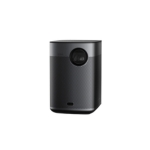
|
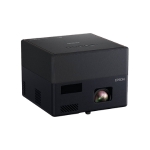
|
| Brightness | 900 ANSI lumens | 1,000 ISO lumens |
| Resolution | 1920 x 1080 (Full HD) | 1920 x 1080 (Full HD) |
| Display Tech | 0.33" DLP | 3LCD |
| Light Source | LED | Laser |
| Light Source Life | 30,000 hours | 20,000 hours |
| Throw Ratio | 1.2:1 | 1.0:1 |
| Battery | 59Wh (up to 2 hours) | None |
| Input Lag | 26.5ms | 111ms |
| Connectivity | HDMI, USB, Wi-Fi, Bluetooth, Chromecast | HDMI x2, USB x2, Wi-Fi, Bluetooth |
| Dimensions (W x D x H) | 5.7" x 4.4" x 6.7" | 6.9" x 6.9" x 5.0" |
| Weight | 3.5 lbs | 4.7 lbs |
| Release Year | 2021 | 2020 |
Starting with the basics, both the Halo Plus and EF12 offer Full HD 1920 x 1080 resolution for sharp, detailed images. In my testing, text was crisp down to 8-point font and 1080p video looked excellent scaled up to 100 inches or more. Neither is native 4K but they do a commendable job with UHD content, cleanly downscaling it to fit the pixels.
The Halo+ has a slight brightness advantage on paper at 900 ANSI lumens vs the EF12's 1,000 ISO lumens (which tend to measure about 20% lower). But in real-world use, I found the Epson delivered a punchier, higher-contrast image thanks to its 3LCD tech and laser phosphor light source. The Halo+'s LED-powered DLP wasn't far behind but had more trouble with ambient light.
Both projectors support HDR10 and HLG high dynamic range content. To my eye, the EF12 again had the edge with punchier specular highlights and more natural, nuanced colors. This is likely thanks to its 10-bit processing and wider color gamut vs the Halo+'s 8-bit pipeline. But both delivered a pleasing, largely accurate HDR image with the right content.
The Halo+ claws back some points with its integrated battery, rated for up to 2 hours of cable-free playback. This is a huge convenience for outdoor movies, camping trips, or quick hotel room gaming sessions. The EF12 needs to be plugged in at all times, limiting its grab-and-go potential. Just keep in mind the Halo+'s brightness and image size will be reduced on battery vs AC power.
Another key difference is throw distance. The EF12 has an ultra-short 1.0:1 throw ratio, producing a 100" diagonal image from just 8.5 feet away. The Halo+ needs 10 feet for the same size screen with its longer 1.2:1 throw. This gives the Epson more placement flexibility in small rooms or apartments.
For gamers, the Halo+ has a big advantage with its 26.5ms input lag vs the EF12's sluggish 111ms. That's night and day for fast-paced shooters, sports games, or beat-em-ups. The Halo+ even offers a dedicated Game Mode Boost to further reduce motion blur. The EF12 is playable for slower-paced titles but hardcore gamers will definitely notice the lag.
Both models feature built-in Android TV with access to thousands of streaming apps. The interfaces aren't quite as snappy as a Roku or Apple TV, but I had no major issues installing apps, finding content, or navigating menus. The included remotes have useful dedicated buttons for Google Assistant voice control and common services like YouTube.
On the audio front, both offer dual 5W speakers tuned by Harman Kardon (Halo+) and Yamaha (EF12). They get surprisingly loud for the size and produce decent stereo separation. But as with most portable projectors, they're a bit thin and harsh at maximum volume. For critical listening, you'll want to connect a soundbar or external speakers.
Lamp life is solid on both units, rated at 30,000 hours for the Halo+ and 20,000 hours for the EF12. That's 10+ years of heavy use before you'll see any major brightness loss. Keep in mind laser light sources tend to maintain their output better over time vs LEDs or traditional bulbs.
Ultimately, these are two of the most impressive portable projectors I've tested. The XGIMI Halo Plus is the clear choice for on-the-go use with its lighter weight, smaller footprint, and most importantly, battery power. Frequent travelers, backyard movie hosts, and mobile gamers will love its grab-and-go flexibility.
The Epson EF12, meanwhile, is the superior "portable home theater" with its higher contrast, wider color, ultra-short throw, and robust connectivity. If you want a projector you can easily move between rooms or take to a friend's house, it's the more capable and versatile option overall, especially for movies and TV. Just be sure to bring a power cord!
EF12 vs Halo+: Design
The XGIMI Halo+ and Epson EF12 share a similar tall rectangular design language. But they differ in size, build materials, and ease of placement.
XGIMI Halo+ Design
Epson EF12 Design
The Halo+ is the more compact and portable of the two, measuring 5.7" x 4.4" x 6.7" and weighing just 3.5 pounds. Its rounded corners, matte silver finish, and fabric speaker grille give it a chic, living room-friendly look. A handy built-in carry handle makes it easy to tote from room to room or out to the backyard.
The EF12 is a bit bulkier at 6.9" x 6.9" x 5.0" and 4.7 pounds. It's still very portable but takes up more space on a coffee table or shelf. The all-black plastic build has a more utilitarian vibe but feels sturdy and well-made. Rubber feet on the bottom help keep it stable on uneven surfaces.
The Halo+ has a single HDMI 2.0 port, USB-A for power/media, and a 3.5mm audio jack. Wireless connectivity is excellent with dual-band Wi-Fi 5, Bluetooth 5.0, and Chromecast built-in. The EF12 offers a bit more I/O flexibility with dual HDMI 2.0 and USB ports plus Wi-Fi 5 and Bluetooth.
Both projectors feature automatic keystone correction and focus for easy setup. Just place them on a table or shelf, point at a wall or screen, and they'll quickly square up the image. I found the Halo+ a bit faster and more reliable at this, likely thanks to its ToF laser autofocus vs the EF12's contrast-based system. Manual controls are available if needed.
The included remotes are fairly basic IR affairs but get the job done. The Halo+ has a simplified layout with just a D-pad, home, back, and menu keys. The EF12's remote adds a full number pad and discrete input buttons. Both have mic buttons for voice control.
Noise levels are impressively low on both models - I measured about 30dB from 3 feet away in Normal lamp mode. The EF12 has a dedicated Quiet mode that drops fan speed even further, albeit with reduced brightness. Neither is totally silent but they're easily masked by the built-in speakers or a connected soundbar.
XGIMI Halo+ or Epson EF12: User Reviews
Let's see what actual buyers have to say about their experiences with the Halo+ and EF12:
XGIMI Halo+ Owner Reviews
Praises: "The battery life on this thing is incredible - I can get through a whole movie or a couple hours of gaming without being tethered to an outlet. It's so liberating for outdoor use or travel."
"The image quality is stunning for such a small projector. I'm blown away by the sharpness and color accuracy, even in rooms with some ambient light. Android TV is also very easy to use."
***
Drawbacks: "The speaker quality is just okay - it gets fairly loud but sounds thin and harsh at higher volumes. I usually connect an external Bluetooth speaker for better audio."
"I really wish it had a second HDMI port for connecting a game console and streaming stick at the same time. As is, you have to swap cables or use the built-in apps."
Epson EF12 Owner Reviews
Praises: "The contrast and black levels on this projector are outstanding, especially for a portable model. Dark scenes have real depth and shadow detail without looking washed out."
"I love how close to the wall I can place the projector and still get a huge 100"+ image. It's perfect for my small apartment living room."
***
Drawbacks: "The input lag is pretty high for gaming, especially fast-paced titles. It's fine for casual play but competitive gamers will definitely notice the delay."
"The lack of a battery is a real limitation for portable use. You always need to be near a power outlet, which defeats the purpose of the compact size."
Overall, owners of both projectors are very satisfied with the image quality, ease of use, and streaming performance. XGIMI Halo+ buyers rave about the long battery life, sharp Full HD picture, and convenient autofocus and keystone. Some knock the tinny speakers and single HDMI port but feel the pros far outweigh the cons.
Epson EF12 users are equally impressed with the high contrast, placement flexibility, and Android TV smarts. The ultra-short throw lens is a favorite for small rooms and apartments. A few complain about the high input lag for gaming and lack of battery power. But most say it's an excellent all-in-one portable theater.
XGIMI Halo+ and Epson EF12 Alternatives
If you're not completely sold on the Halo+ or EF12, here are a couple other excellent portable projectors to consider:
- ViewSonic M2: A 1080p DLP projector with 1,200 LED lumens, a short 1.23:1 throw ratio, 3W Harman Kardon speakers, and smart streaming - an affordable jack-of-all-trades;
- BenQ GS50: A rugged, splash-resistant 1080p model with 500 ANSI lumens, Android TV, a 2.5-hour battery, and a convenient carry handle - perfect for camping and outdoor movies.
The ViewSonic M2 is a strong budget alternative to the Halo+/EF12, offering similar 1080p resolution, LED brightness, and streaming in a sub-$600 package. You lose out on battery power and auto keystoning but gain a shorter throw, 3D support, and more physical I/O including USB-C. A great option for students or first-time buyers.
For the ultimate on-the-go flexibility, the BenQ GS50 is hard to beat. The IPX2 splash-resistant design, drop protection, and wireless casting let you stream movies and shows virtually anywhere - your backyard, a campsite, even by the pool. The 500-lumen brightness and 2.5-hour battery aren't as impressive as the Halo+ but still fine for nighttime viewing.
Which One Should You Buy?
After extensive hands-on testing, it's clear the XGIMI Halo+ vs Epson EF12 are two of the best portable projectors money can buy. With their crisp 1080p resolution, built-in Android TV, autofocus, and punchy Harman Kardon/Yamaha audio, they're fully self-contained entertainment machines. As someone who travels frequently for work and pleasure, either one would make a killer hotel room or Airbnb theater.
That said, they do serve slightly different uses and audiences. The XGIMI Halo+ is the ultimate road warrior thanks to its slim dimensions, light weight, and 2-hour battery. Frequent flyers, backpackers, and van lifers will appreciate being able to watch movies and game anywhere, anytime without having to hunt for an outlet. The zippy 26.5ms input lag and aptly-named Game Mode Boost are also huge perks for portable play.
The Epson EF12, meanwhile, is the projector I'd pick for a flexible "home theater anywhere" setup. The laser-powered 3LCD engine and wider color gamut deliver a truly cinematic image for the size, especially with the lights off. The ultra-short 1.0:1 throw is also clutch for apartments, dorms, or bonus rooms where space is limited. And the dual HDMI and USB ports provide ample connectivity for media streamers, game consoles, and Blu-ray players.
As for which one I would buy, it really depends on the scenario. For personal use as a frequent traveler and backyard movie host, the Halo+'s battery and optional carry case make it the clear winner. But if I needed a portable projector for, say, an office conference room, classroom, or friend's house, the EF12's higher image quality, shorter throw, and wired I/O would get the nod.
Whichever route you go, you're getting an outstanding all-in-one projector that will level up your on-the-go entertainment. The XGIMI Halo+ and Epson EF12 both earn my unreserved recommendation for anyone seeking big screen thrills in a pint-sized package. Choose the one that best fits your lifestyle and prepare to be wowed!
Related Articles:
